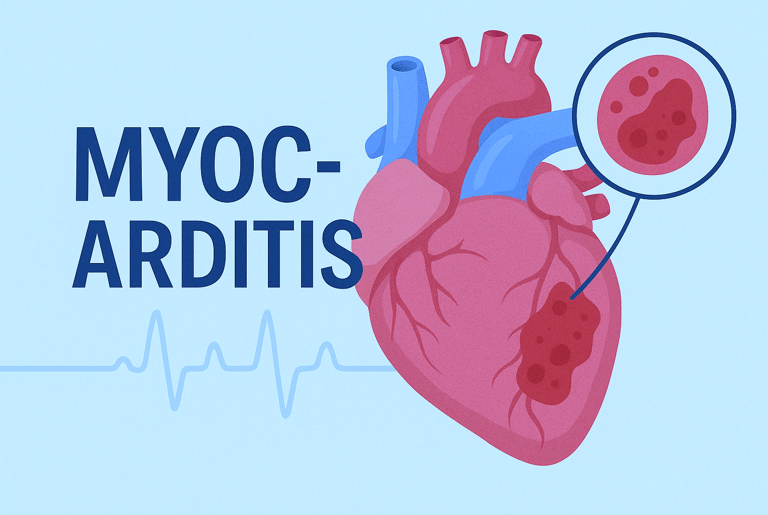Stay updated on what is trending in health. Discover tips and resources for a healthier, balanced life.
Myocarditis: What You Should Know About This Silent Heart Inflammation
What is myocarditis? Learn about the causes, symptoms, treatment, and prevention of this silent heart inflammation in simple, conversational language. Stay heart smart with PulseYourHealth.com.
DISEASES AND CONDITIONS
Dr. S. Ali
5/22/20253 min read


Ever heard of myocarditis? If not, you’re not alone—but this condition is something everyone should be aware of. Myocarditis is a type of heart inflammation, and although it can sound scary, understanding it is the first step to protecting your heart.
So, What Exactly Is Myocarditis?
In simple terms, myocarditis means inflammation of the heart muscle—specifically the myocardium, which is the the muscular layer responsible for your heart’s pumping action. When this muscle gets inflamed, it can affect your heart’s ability to pump blood and maintain a regular rhythm.
Think of it like this: your heart is your body's engine. If the engine becomes swollen or irritated, it's going to have trouble running smoothly.
What Causes Myocarditis?
There isn’t just one cause—myocarditis can happen for a variety of reasons, but the most common one is a viral infection. That means a regular cold or flu virus (like coxsackievirus, adenovirus, or even COVID-19) can sometimes lead to this condition.
Other causes include:
Bacterial or fungal infections
Autoimmune diseases (like lupus)
Certain medications or toxins
Reactions to vaccines (very rare, but possible)
Radiation or chemotherapy
In short, anything that triggers an immune response can potentially inflame the heart muscle.
How Do You Know If You Have Myocarditis?
Here’s the tricky part: symptoms of myocarditis can vary widely. Some people don’t feel anything at all, while others may feel like they’re having a heart attack.
Common symptoms include:
Chest pain or discomfort
Fatigue
Shortness of breath, especially when lying down or during physical activity
Rapid or irregular heartbeat
Swelling in the legs or ankles
Lightheadedness or fainting
If you're experiencing any of these and they’re not going away—or getting worse—it’s time to talk to your doctor.
Is It Serious?
It can be. While many cases of myocarditis go away on their own with rest and treatment, others can lead to more severe complications like:
Heart failure
Arrhythmias (abnormal heart rhythms)
Cardiomyopathy (weakening of the heart muscle)
In rare cases, even sudden cardiac arrest
That’s why it’s so important to catch it early and treat it properly.
How Is Myocarditis Diagnosed?
If your doctor suspects myocarditis, they’ll likely start with a physical exam and go on to order tests such as:
Electrocardiogram (ECG) – to check your heart rhythm
Blood tests – to look for signs of inflammation or infection
Echocardiogram (ultrasound of the heart)
Cardiac MRI
In rare cases, a heart biopsy might be needed
What’s the Treatment for Myocarditis?
Treatment depends on how severe the condition is. In many mild cases, rest and over-the-counter anti-inflammatory medications (like ibuprofen) are enough.
More serious cases may require:
Prescription medications to help the heart pump better
Medications to control arrhythmias
Steroids to reduce inflammation
In extreme cases, devices like pacemakers or even a heart transplant
But don’t worry—those are rare. Most people recover fully with proper care and time.
Can You Prevent It?
You can’t always prevent myocarditis, but you can reduce your risk. Here’s how:
Practice good hygiene (especially handwashing!)
Don’t ignore viral symptoms—rest and recover
Avoid exposure to known toxins or illegal drugs
Manage chronic conditions like high blood pressure and diabetes
When Should You See a Doctor?
If you’ve recently been sick and start experiencing unusual chest pain, fatigue, or trouble breathing—especially if it’s new or worsening—don’t wait. Early detection can make a huge difference.
Final Thoughts
Myocarditis might not be on everyone’s radar, but it should be. Knowing the symptoms, causes, and when to seek help can go a long way in keeping your heart healthy and strong.
Stay informed. Stay heart smart.
Related Articles:
Sources:
Centers for Disease Control and Prevention (CDC) – Myocarditis Overview
https://www.cdc.gov/heart-disease/myocarditis.htm
Mayo Clinic – Myocarditis: Symptoms and Causes
https://www.mayoclinic.org/diseases-conditions/myocarditis/symptoms-causes/syc-20352539
American Heart Association – Myocarditis Information
https://www.heart.org/en/health-topics/myocarditis
WHO - Disease Outbreak News: Myocarditis – United Kingdom
https://www.who.int/emergencies/disease-outbreak-news/item/2023-DON465
Pulse Your Health
Empowering you to achieve your health goals.
Contact
© 2026. All rights reserved.
Disclaimer: The content on this website is for informational purposes only and is not medical advice. Always seek the advice of your physician or other suitably qualified healthcare professional for diagnosis, treatment and your health related needs.
